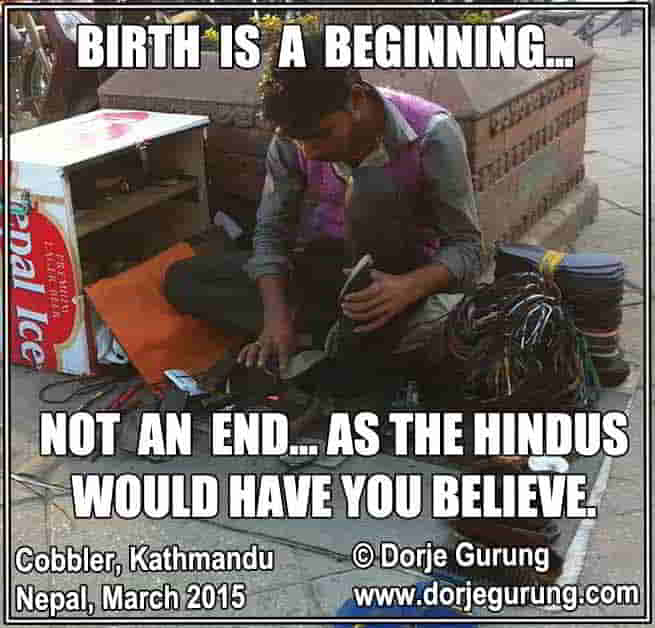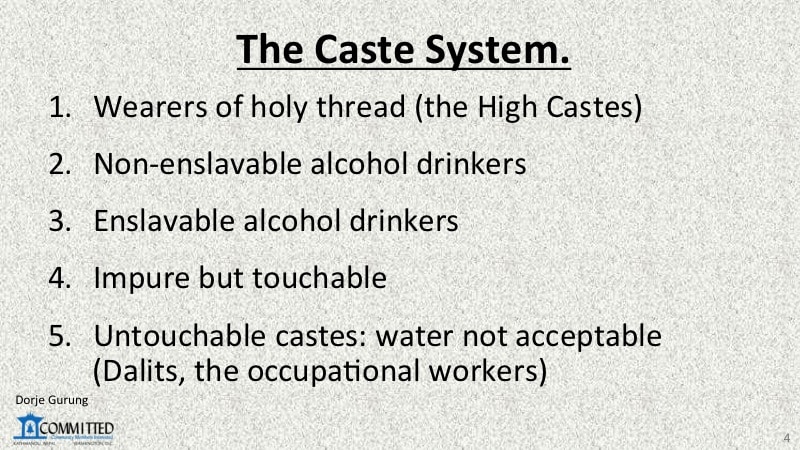Birth is a beginning, not an end…as the Hindus would have you believe.
Recently, some young adults in Rukum were shown how birth as Dalits, as untouchables, can mean a very horrendous and dramatic end to life when they were on the cusp of starting a new phase in their lives: that of adulthood! A girl-child too, very recently, was shown the same. And they are not the only ones nor will they remain the only ones. But I am getting ahead of myself.
How is that possible? The Hindu social system, the pernicious and insidious monstrosity of the caste system — based on a spurious logic, might I add — makes that possible.
The caste system, the social system of classifying people by their birth profession, was enshrined in the Muliki Ain (Law of the Land, i.e. the constitution) of 1854 by the Brahmins/Bahuns and the Chhetris — the hill so-called high caste Hindus (see image below) — also referred to as the Khas-aryas.
To reiterate something I have said elsewhere: to believe in the doctrines and principles tied to a religion — such as karma, reincarnation and compassion — and to live according to their dictates is one thing.
To require others to also embrace that belief system is going a step further.
To use that belief system to explain the circumstances of someone else’s birth and/or the conditions of someone else’s life, and as a yardstick to pass judgement on it is pretty misguided.
To make someone else suffer for their birth into a less fortunate set of circumstances, using that belief system—the idea of karma and reincarnation, for example—is plain WRONG!
Nepal (and India) we don’t have a dearth of individuals who do that though. We do have Indian Subcontinentals who view the context and circumstances of a person’s birth as an end in itself. Consistent with that belief system, they make others suffer, others they see as below them in the highly discriminatory caste system.
In other words, there are those among Hindus who believe that the context and circumstances of ones birth, specifically one’s caste, is an end result of ones actions in previous life, and therefore deserving of all the challenges life throws at them, including all the abuse and mistreatment meted out to them. Throughout history, the high castes (see image above) oppressed and exploited those belonging to other castes. The ones who were oppressed and exploited the most as a caste were the Dalits, the untouchables, the ones who were born a cobbler (see header image), a tailor, or a blacksmith etc.
But, of course, again, that’s WRONG.
Birth is a beginning! The beginning of one of the most — if not THE most — miraculous of all that which comes into being on this planet and possibly on the entire universe: human life!! It’s the beginning of unrealized, unpredictable, and unimaginable potential.
That which determines whether the being realizes his or her human potential is simply opportunities! Opportunities can turn the lives of the ordinary extraordinary!
If Nepali society is to advance, if it’s to make social and spiritual progress, it must stop putting obstacles in the paths of so many of its citizens, or worse devalue the lives of so many, while actively endowing with structural privileges the so-called high castes without really testing or challenging them.
The devaluation of the lives of Dalits is so bad that at times they end them as callously they did the lives of Nabaraj and his friends in Rukum, and the 13-year old girl in Rupandhehi recently.
In Nabaraj and his friends’ case, a mob of villagers murdered them for daring to come to their village to elope with the higher-caste girl he was in love with.
In Angira Pasi‘s case — the 13-year old girl — she was raped on a Friday. Saturday morning, the community members and the local authorities convinced the mother, a destitute widower, to marry off the girl to her rapist as “punishment” to the perpetrator. That very afternoon, her lifeless body was found hanging from a tree!
As if being raped and losing her dignity were not enough, as if the additional indignity of being married to her rapist hadn’t been enough, as if the family of the rapist attacking her for being a Dalit hadn’t been enough…she had been “disposed” of because the family didn’t want a Dalit for a daughter-in-law.
What happened to the little Dalit girl is NOT an aberration. Dalit females are raped at disproportionately high rate. To quote:
According to Jagaran Media Centre, of the 1130 cases of rape registered in Nepal police office last year, Dalit women made up 19 percent of all the cases. By comparison, Dalit women comprise a little more than half of the 13.2 percent Dalit population of Nepal. More shockingly, 22 percent of all rape cases against minors were against Dalit children. It’s likely that the number of rape cases against Dalit women is even higher. Incidents of rape are notoriously underreported in Nepal because of a culture of silence, lack of faith in the justice system, centralised police offices, lack of education, awareness and privilege. Dalit women face additional barriers. That’s how monstrous the caste system is. [Emphasis mine.]
This article lists 15 other instances over the last ten years of the murder of Dalits for essentially being Dalit. That’s how monstrous the caste system can be to them.
I am certain many Hindus in Nepal will explain away the pain and suffering of the Dalits saying that they “deserved it,” that they are paying in this life for the kind of lives they must have led in the previous lives. Similarly, the structural privileges enjoyed by the hill so-called high caste Hindus by birth, many also explain away, I am pretty sure, by saying that they must have accrued sufficient merits in their past lives to “deserve them” in this.
But, I also imagine most — if not pretty much all — Nepalis take pride in Buddha being born in Nepal. I did too when I was growing up. But how many are even willing to acknowledge or concede that, if indeed he was born in Nepal, he would be a Madhesi, to begin with. Forget something so minor but so telling! How many consider what he preached and stood for to be more important than where he was born?
Two things he preached AGAINST were violence and the caste system.
But what do we have in Nepal? Will the pandemic open the eyes of many to this and help the society forge ahead? Maybe?
Given the poor level of both awareness and education of the population, I really doubt it though. 🙁 🙁
Regardless, birth is a beginning…not an end!
What do you think?


